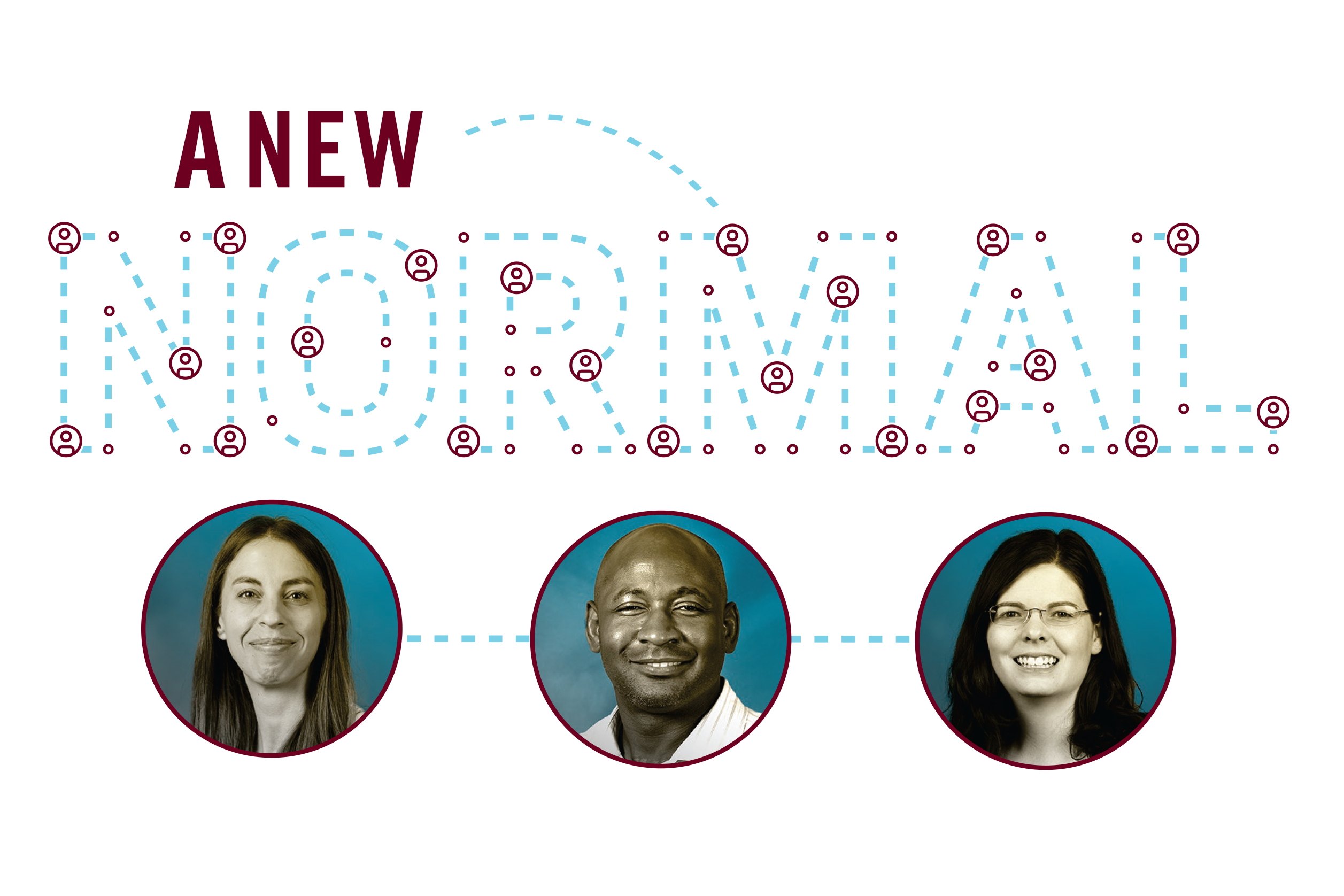Elon experts talk about the possible long-range impact of the COVID-19 pandemic on everyday life.
When CJ Fleming was a child, her grandmother had a kitchen drawer filled with used plastic bags. “I hated that drawer,” Fleming, an assistant professor of psychology, recalls. “I didn’t understand the drawer. Ziploc bags are disposable. You are supposed to throw them away.”
In early April, just a couple of weeks after Elon University switched to online classes to comply with the Centers for Disease Control and Prevention’s recommendations to slow the spread of COVID-19, Fleming, much to her surprise, saved her first Ziploc bag. “I didn’t know if I was going to be able to find more,” she says.

Relatively speaking, it’s a small change, but telling. In a short period, the threat of COVID-19 has left a mark that’s not likely to go away anytime soon. It has infiltrated our lives, changing how we work, learn, shop, interact and relate as a society. “This is definitely a generation-defining experience for people who never lived through something like this,” Fleming says. “We have changed how we buy things and how we go about our daily business.”
While stay-at-home orders have lifted in some places and remain in place in others, the long-range impact of the pandemic on the economy, health care, relationships and society as a whole remains unknown. When the dust settles, what new reality will emerge?
Examining pandemics — their impact on society and public health — isn’t new for Katherine Johnson, assistant professor of public health studies. Before she joined Elon’s faculty five years ago, she worked for the CDC in the Division of Global Migration and Quarantine. Among the courses Johnson teaches at Elon is a core capstone that focuses on disease outbreaks and their potential to spread quickly in a globalized world.
Is it possible to predict or prevent the next pandemic? It’s a question raised in her course along with the policies and process of governance in responding to diverse outbreaks and public health challenges. Students also examine how shared fears and priorities evolve as a result of a pandemic like COVID-19. “Right from the beginning of class, students were already connected to the content because it was in their daily lives,” Johnson says. “In the past, students didn’t have the same perception of the impact of pandemics.”

Waseem Kasim, assistant professor of history, conducts research on the ways public health informs the construction of cities. He also teaches The World in the 20th Century, a course that looks closely at the 1918–19 flu pandemic. As was the case with that outbreak or h1n1, there are lessons to be learned that will influence how we move on as a society. Historically, Kasim says, one of the criticisms leveled is in the way we deal with pandemics. “We treat them as wars,” Kasim says. “They come and we defeat them and then go on with our lives when dealing with it on a daily basis is more helpful.”
If we want to evolve as a society, going back to the status quo isn’t an option. “No matter how nasty a piece of information is, it is good that we remember lessons from it so that it doesn’t happen again,” he says.
Johnson sees opportunity for change. “We can choose to ignore the lessons and hope our lives go back to normal as soon as possible, that is if we liked our life,” she says. “But it also gives us the opportunity to examine these questions we have struggled with forever.”
Social distancing and stay-at-home orders have forced people to stay in and reconnect with immediate family, drawing attention to work-life balance and rocky relationships. “Based on the research, when an event such as this one happens, people go one of two directions,” Fleming says. “Some people look for the silver lining. They seek out the positive. They show gratitude. Others go through depression and experience stress and anxiety.”
These varied coping mechanisms impact how people and relationships fare. In China, for example, there was a surge in the divorce rate in March following the end of government-mandated lockdowns. “Coming out of the end of this, if there is an end, we will see people who will be grateful for the little things, like eating in a restaurant,” Fleming says. “We will also see people who have a post-traumatic stress response.”
“Coming out of the end of this, if there is an end, we will see people who will be grateful for the little things, like eating in a restaurant,” Fleming says. “We will also see people who have a post-traumatic stress response.”
Empty grocery shelves and shortages of everything from masks to disinfectant, meat, flour and paper products have led many to adopt more sustainable habits and find homemade solutions. Soaring unemployment rates, small business grants and loans, federal stimulus checks and state-sanctioned orders to close everything except essential businesses have many questioning governmental policies and procedures and the economic impact of such measures. Ultimately, the impact the coronavirus has on our healthcare system and public health, in general, remains to be seen. Just like the 1918–19 flu pandemic, social injustices and economic inequities have been magnified.
In New York City, where the coronavirus was the cause of more than 15,000 deaths by mid-May, blacks and Hispanics were dying at twice the rate of whites, according to statistics released by the New York City Department of Health and Mental Hygiene. The pandemic contributes to the struggles and injustices that are already going on, Kasim says. “It also highlights that people need health care. While this is a conversation that was already going on, it will become more bolstered by this,” he says.
The 1918–19 flu pandemic took its toll on India, killing millions of people and causing a revolt that led India to seek independence from the British. “It’s not farfetched to say there will be movements demanding more social justice and equality in our society,” Kasim adds.

A new generation of students will potentially consider and seek careers in health care and public health, Johnson says. She expects that newfound knowledge of public health — both its value and deficits — will emerge. “It’s our opportunity to build a better society if we choose to,” Johnson says. “I’ve heard others say it has raised awareness about the discipline of public health, something that before COVID-19 wasn’t necessarily well understood by many.”
There is also personal, emotional suffering that occurs during pandemics. The loss of life and inability to mourn and celebrate with traditional funerals and burials are often forgotten once society resumes some semblance of normalcy. “We talk about these broader impacts, but we shouldn’t forget about the impact on the ordinary person who is suffering from the loss of a loved one,” Kasim says. Pandemics touch the lives of everyone, which has its benefits. “It creates an opportunity to think about how we want to invest and prepare for future pandemics,” Johnson says. “So that next time, it won’t impact us collectively so much. That’s where it needs to go. The question is, will it?”



